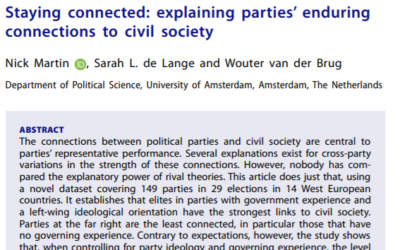RESEARCH TOPIC
In the last two decades electoral volatility in Western Europe has increased dramatically and mainstream parties have faced new challengers. Some parties of the radical left have achieved electoral breakthroughs while others have remained marginal in electoral terms. My research seeks to establish the role played by party connections to society in the political strategies of parties of the left. While traditional ties to trade unions and mass memberships have declined in importance other ties to civil society may continue to play an important role in the stable attachment of electorates. My research is using an original data set of elections since 1986, qualitative analysis and case studies to develop a novel account of party strategies towards organized civil society.
Main areas of interest
- Comparative political strategy
- Elections and electoral volatility
- The links between political parties and civil society
- Political mobilization and the radical left
- Quantitative and qualitative research
PRESENTATIONS
‘Staying Connected: Explaining parties’ enduring connections to civil society.’
Presentation of my paper written with Sarah de Lange and Wouter van der Brug, ECPR Standing Group on Political Parties, Summer School, Aarhus, August 2021. Nominated for the Peter Mair Award for best paper at the conference.
‘Holding on to voters in volatile times: Bonding voters through party links with civil society’.
Presentation of my paper written with Sarah de Lange and Wouter van der Brug, ECPR Virtual General Conference, 26th August 2020 as part of the panel titled ‘Left Foot Forward? European Social Democracy in Hard Times (Again)’
‘The Long March of the British Right: From Gloom to Ascendancy in Six Elections’.
Contribution to workshop on ‘Brexit and the Transformation of party fortunes in the UK’, 11th February 2020. With Marcel Hanegraaff (University of Amsterdam) and Tim Bale (Queen Mary’s College, University of London).
Publications
Blog published by the LSE European Politics Blog on 10th February 2021, Paying the Price: Why Parties that turn their backs on civil society face electoral upheaval – https://blogs.lse.ac.uk/europpblog/2021/02/10/paying-the-price-why-parties-that-turn-their-back-on-civil-society-face-electoral-upheaval/
Published online in December 2020
Holding onto voters in volatile times: Bonding voters through party links with civil society, with Sarah de Lange and Wouter van der Brug, in Party Politics – https://journals.sagepub.com/doi/10.1177/1354068820980304
Blog published by the LSE British Politics Blog on 1st December 2020, Green councillors, Labour MPs: time for the Greens to stop wishing away reality and shift strategy. https://blogs.lse.ac.uk/politicsandpolicy/green-party-strategy/



